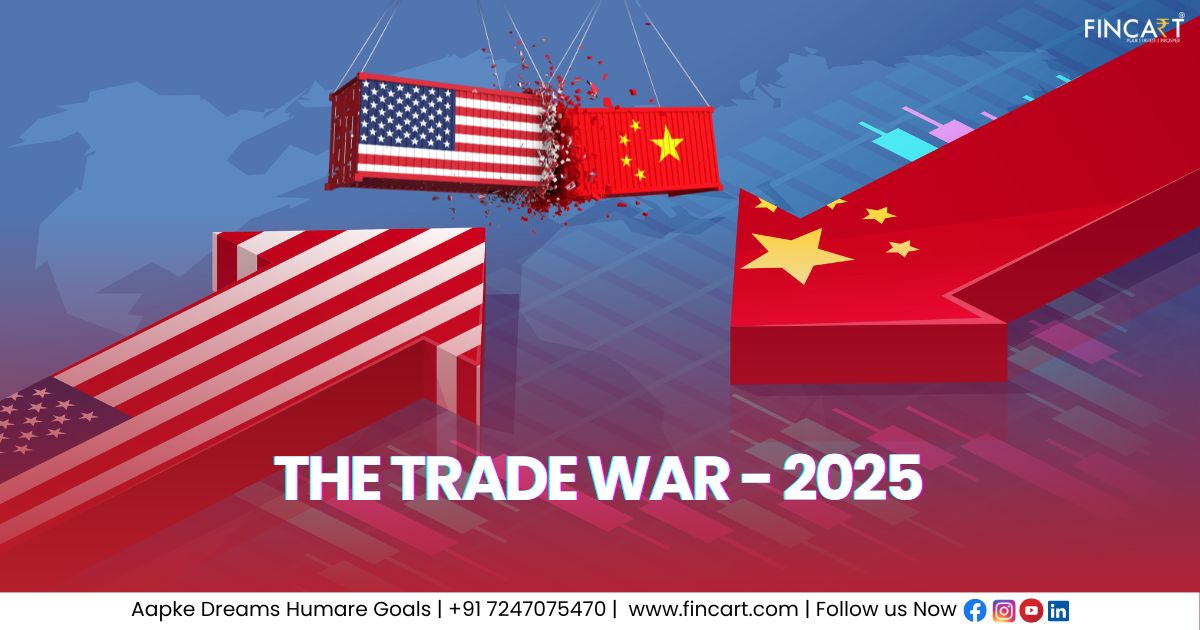How did the trade war affect US and Indian Equity Markets in the past?
Trump tariff war during his last tenure in 2018 led to increased disputes amongst the World Trade Organisation. The global GDP fell from 3.6% (2018) to 2.9% (2019) as per the IMF data. The global supply chain disruptions increased costs, the consumer price index rose by 0.3% in the US. To combat the slowing economy, the Fed went ahead and did 3 rate cuts in 2019 to support the slowing economy. The other central bankers also turned dovish. The volatility index increased, the S&P 500 fell 6%. Post rate cut and flight for safety increased demand for bonds, consequently the US bonds yield dropped from 3.2% to 1.6%.
History might repeat itself, the world bank estimates a drop in global GDP by 0.5% – 0.75%.
During the last trade tariff the Indian Equity market saw increased volatility and the FII outflow to the tune of USD 5 Billion. INR depreciated by 10% in 2018 (from 63 to 74/USD), partly due to rising oil prices and capital outflows driven by global trade tensions.
| Period | Key Events | Nifty Movement | Remarks |
| Jan–Feb 2018 | Pre-tariff environment | Peaked around 11,100 | Strong earnings optimism |
| Mar–May 2018 | Steel & aluminum tariffs | Fell to 10,000 | Global sell-off, FII outflows |
| Jun–Aug 2018 | US-China trade war escalates | Recovery to 11,700 | Supported by domestic flows |
| Sep–Oct 2018 | Currency depreciation, oil surge | Dropped sharply to 10,000 | Crude oil crossed $85/barrel, INR hit record lows |
| Nov–Dec 2018 | Stability returns | Recovered to 10,900 | Fall in oil prices, easing tensions |
The risk that will lead to increased volatility:
• Global slowdown impacts exports.
• Rupee volatility and capital outflows risk
• Oil & commodities prices rise → higher import cost
The trade tariff increase will impact India as well. The decline in exports earning, capital outflow on account of uncertainty and any increase in crude oil prices will affect the Indian economy. Given the global slow down, the demand for crude oil is expected to remain subdued, any decision by curb production may impact crude oil prices.
What should investors do?
Trade wars hurt global growth, create inflation risks, and lead to volatile markets. This event impacts export oriented economies more adversely. India is not an export driven GDP, hence we will see limited impact. Our reliance on domestic consumption makes our economy more self-reliant. The relative impact of the trade tariff war in India is very limited.
India may face short-term pain in exports and inflation sensitive sectors. Having said that, the long term opportunity remains intact.
India is a strong economy that is very well diversified, with a strong reliance on domestic consumption and infrastructure led growth.
Any fall in the equity market should cheer long term investors and it is a great opportunity to buy on dip. SIPs must be continued at all times to leverage the real power of rupee cost averaging.
The article is authored by
Tanwir Alam
Founder & CEO
FINCART Finvest Private Limited
Disclaimer: Fincart Finvest Private Limited is a AMFI Registered Mutual Fund Distributor. The views expressed in this article are the personal opinions of the author and are intended for informational and educational purposes only. They do not constitute investment advice or recommendations to buy, sell, or hold any financial instruments, including mutual funds. While every effort has been made to ensure the accuracy and completeness of the information provided, readers are encouraged to independently verify the facts and consult with a qualified financial advisor or conduct their own research before making any investment decisions.
Please note that mutual fund investments are subject to market risks, and past performance is not indicative of future results. The impact of trade wars or other global economic factors on the Indian mutual fund market may vary based on individual circumstances, market conditions, and evolving dynamics. The author and publisher of this article disclaim any liability for financial losses or damages incurred as a result of reliance on the information provided herein.
Always invest responsibly and make informed decisions.




